
Sign up today...
for featured titles, special offers, bestsellers, and more, in your inbox!
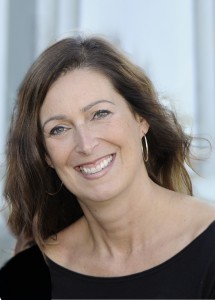 Michelle Halket, Publisher, Central Avenue Publishing, shares her unique insight as a digital pioneer. We discuss the early days of digital publishing, the breadth of social media marketing, and the flexibility that comes from being an independent publisher.
Michelle Halket, Publisher, Central Avenue Publishing, shares her unique insight as a digital pioneer. We discuss the early days of digital publishing, the breadth of social media marketing, and the flexibility that comes from being an independent publisher.
IPG: Can you tell me a little about how Central Avenue Publishing was started?
Michelle Halket: Unlike many in the publishing industry, I didn’t work in it before this — I worked for Nielsen in retail market research. I’ve always been an avid reader and the idea for this company started with a conversation in 2008 about how it should be easier for authors to get their work read. Ebooks were in their infancy and being a tree-hugging, book-loving technophile, the whole idea of a low cost, environmentally sound way to publish books really intrigued me.
The first iteration of Central Avenue Publishing was ireadiwrite Publishing, which was basically a DIY type of venture where we would take anything that anyone submitted and put it into the many ebook formats and sell it on our website. A year later, I wanted a change. I wanted to feel really passionate about what I was helping to put out into the world and so we adopted a more traditional publishing model while still being true to our roots of publishing work that others might not.
IPG: What differentiates Central Avenue from other publishers?
Michelle Halket: You know, that’s a really hard one to answer. I don’t think any publisher is much different from any other one. We’re all in it for the same reasons, to publish books that we feel passionate about. I think our roots are different, in digital, and we remain pretty strongly tied to that side. 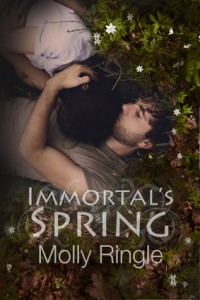 But the actual books and process aren’t better or different than any other good publisher.
But the actual books and process aren’t better or different than any other good publisher.
I do believe that being a small publisher means we can change with the tides a little easier and quicker than bigger ones. It’s been the reason that we’ve made it thus far — reading the market and staying on top of it. And we’re small, really there’s just me and my authors. I work on each book personally and I outsource anything that I can’t or don’t have time to do.
IPG: What do our readers need to know about your books?
Michelle Halket: Well, that they’re awesome, of course! Speaking more seriously, I suppose we take a lot of pride in them. They’re truly a collaborative effort of the heart and soul on the part of the author and myself. We put some really good energy into our books and I think it shows through.
IPG: What has your experience been with independent publishing? What are the benefits? The drawbacks?
Michelle Halket: It’s been a truly amazing experience. And a truly challenging one. I think we’ve been up against a lot of prejudice since we started. First it was ebooks, when everyone else thought they were for self-help or get-rich-quick pamphlets. Then, it was the prejudice against small pubs, and then it was the judgment against and non-acceptance of books produced using POD.
Thankfully, a lot of that has changed now and this old industry is catching up with the times.
The rewards have far outweighed our challenges. I didn’t mind being ahead of the curve. I liked educating people on what I was doing. We have had numerous bestsellers – selling quantities that would rival the big houses – and being able to work to my goals and ideals has been amazingly freeing. I don’t have to kowtow to any corporate numbers or only choose books for their market value. I can choose to work on lit fiction, poetry, or memoirs from non-celebrities because they mean something, they contribute to the book world in a real way. I don’t think other publishers have that freedom. I know I could sell books if they tied into a celebrity or some other current event, but I don’t have to and I feel it advances the frontier of reading and book making.
IPG: What advice do you have for prospective independent publishers today?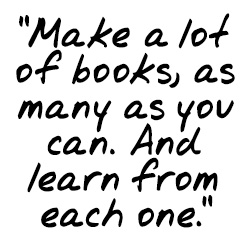
Michelle Halket: My best advice is to play the long game. Don’t try to come out with guns a-blazing, spending money left and right on your one season of a few books. Start really small, digital if you can, and keep costs as low as possible. Don’t spend what you make, invest it back into the company and plan on being around for a few years till you can make some money. Make a lot of books, as many as you can. And learn from each one.
Ideally, a publisher isn’t a writer. I think that being a writer/publisher often means that you become too vested in books, getting caught up in the writing/editing side and letting the other aspects of publishing slide. I’ve seen many, many writer/publishers come and go and I really feel for them, since they’re hard-working, intelligent people. Now, I know there will be a ton of responses to this, refuting what I’ve said and giving me great examples of self-published authors who’ve made it or started their own imprints (e.g. Amanda Hocking, Meredith Wild, John Locke). But there are few people who can do it all, or who want to, and now there is a pressure on writers not only to write well but to be publishers too. It’s a tough game and I could only imagine that doing both is exhausting.
But no matter who you are: editor, writer, or ex-market researcher: if you want to try it, do it! Remember that it’s a long term business, think ahead, save money, publish as many books as you can. Keep the quality up, but don’t sacrifice getting them out there because it needs to be *perfect*. They’ll never be perfect, they can always be revised, have a new cover, price adjusted, etc. Keep releasing books and continue to work with authors who are professional, also have the long game in mind and moreover – whose personalities meld with yours. And by far the most important: treat your writers well. Pay them regularly, fairly, and on time. Answer their emails quickly and remember that they’re the reason you even have a business.
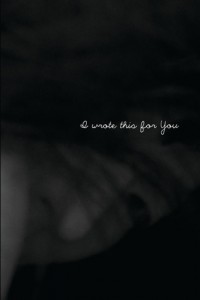 IPG: You’ve achieved viral success a number of times, particularly with I Wrote This for You. How did you reach viral status?
IPG: You’ve achieved viral success a number of times, particularly with I Wrote This for You. How did you reach viral status?
Michelle Halket: The funny thing about each of our books that have done well is that I believe that each of them did so for different reasons. I will tell you the things they had in common. For one, most were appealing to young adults. In a world where books and their distribution was changing so much, it was younger people who were trawling the net looking for new reads, communicated online, and for the most part, pirated content. I don’t advocate pirating, but I have never tried to take any of our books off pirate sites. The pirate sites were part of the reason we went viral on some books.
The second reason is that each of those books had authors who were extremely active online but in different ways. The creators of IWTFY give away their work for free online. For them and me, it’s not about making money, it’s about sharing art. This global sharing led people to talk about it. But not everyone wants virtual art, they want something tangible. So when the book was released it did — and continues to do — very well. For Suzi Davis, (The Lost Magic series), she connected with bloggers who were gaining momentum. They glommed onto the books and loved them and her for contributing a mutually supportive arena. For NM Facile (Across the Hall), the book started as Twilight fan fiction and a lot of the earlier drafts were posted in writing forums. The author connected directly with her readers and gave them what they were looking for. For Annie O’Sullivan, (Can You Hear Me Now?) she used her history as a child abuse victim to help others in the same situation by appearing on radio, blogs and by speaking openly.
IPG: How do you incorporate social media into your marketing strategy?
Michelle Halket: In the early days of my company, and being a newbie to the industry, Twitter was my lifeline. It was this cool medium where I could listen to people discussing real things – and they weren’t selling me anything. They were just talking and collaborating. I met some of my authors on Twitter, learned some typesetting tricks and solved ebook coding problems by tuning into hashtags. There were fewer bloggers around, Facebook was easier to understand (and to be heard), and Instagram didn’t really exist. But since the beginning, I have always striven to remain professional and treat people as if I was speaking to them in person.
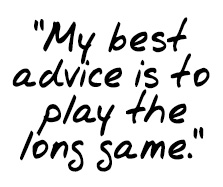
Today, my social media strategy is a little different. I think I’m still kind, but I don’t engage on Facebook much anymore. Unless you’re paying for boosted posts, very little gets fed out to readers’ feeds, so I don’t really see the point. I use Twitter more to support those people I already know, rather than meeting new ones. I do listen a lot more than I talk, I only follow people who aren’t constantly selling me something and I listen to what is going on in the industry. I feel that the noise on Facebook and Twitter is so loud that it’s hard to be heard and I don’t want to contribute to the noise.
That said, I still use Twitter every day, I post to Facebook and Goodreads once or twice a week, and I blog and Instagram once every couple weeks. When I’m looking to promote a book, I think reaching out to other bloggers who have dedicated readers is the best use of social media. I know that they each have between 5 and 5000 people who actively read what they’re writing. I also use our robust mailing list with MailChimp; Rafflecopter for our multiple giveaways; and Goodreads for the giveaways and stats they offer (for free!) to help me see what people are reading or would like to read.
IPG: You’re one of our publishers that was there for the early days of digital publishing. Can you tell us a little about your experience as a “digital pioneer”?
Michelle Halket: What a trip it’s been. As I mentioned, the early days of digital publishing had me holding up my newly acquired smart phone and trying to show people what an ebook was, researching what happened in the music and film industry, learning ebook coding for several different formats, and trying to get distribution with each of the many stores offering ebooks. I supported the new bookstores and platforms that would come online only to watch them fail miserably. I watched many bookstores, formats, publishers come… and go.

The first few years were hard, I think my revenues were $900 in 2009. But in 2010/2011 when ebooks really took off, I had already made my mistakes, learned where to spend my energy, had a few books go viral and the market had dwindled down to a handful of stores and only 2 real formats. Then I could focus less on the technical side and more on the quality, marketing and sales of our books. Now that ebooks have levelled off (anyone worth their salt knew that would happen), it’s time to re-evaluate again. I have always believed that paper wasn’t going away, and now it’s time to strike a resounding format chord which balances paper, ebook and audio.
IPG: How do you pick the titles you going after?
Michelle Halket: I have three criteria for judging a book – writing, plot and characters. It needs to be fantastic in at least one of those areas — ideally all three! Of course, the author needs to have all the boxes ticked: professional, dedicated, etc. However, my overriding rule is whether or not I personally and professionally connect with the author. I want to rely on them, and they need to do that with me since I invest a lot in them and they’re trusting me with their literary babies.
IPG: What’s next for Central Avenue Publishing?
Michelle Halket: Next is getting to know my new distributor and all the avenues they’ve opened up for me! I know this is old hat to the vast majority in publishing, but working with traditional distribution has meant an overhaul of how I do business. I only use POD sparingly and have moved to offset for my new and best titles. I can now submit to the large reviewers without fear. I have access to bricks and mortar outlets I could have only dreamt of. I have a group of people I can rely on for good advice and information. There are multiple teams of people showing off my books to their customers.
For someone who came in at this through a different angle and who works by herself in a small town outside of the meccas of publishing, this is a huge change. I figure the next year will be spent seeing how all this goes while maintaining my old tenets of slow organic growth that will sustain all of us.
IPG: Finally, where do you see Central Avenue in five years?
Michelle Halket: I see great things. I see a NYT or USA Today bestseller. I see more viral books. I see regular write ups on us and our authors. I see foreign rights deals. And I see me being there for all of it — but perhaps not all by myself.
[…] few days ago, I had the pleasure of being in the spotlight over at the IPG blog: This is a repost from that […]